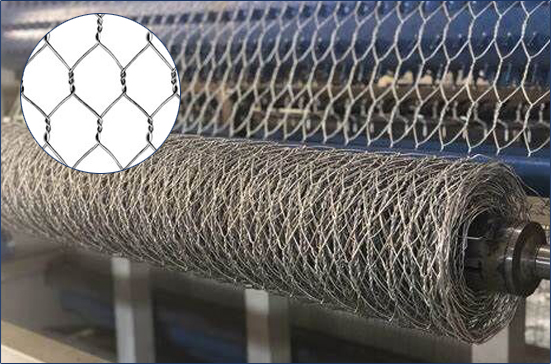Difference Between Heavy-Duty Hexagonal Mesh and Small Hexagonal Mesh
Hexagonal mesh is a type of wire mesh with twisted hexagonal openings, which can be classified into heavy-duty hexagonal mesh and small hexagonal mesh. While they may appear similar in appearance, their applications are quite distinct. Below, we will discuss the differences between the two:
Heavy-Duty Hexagonal Mesh Overview Heavy-duty hexagonal mesh is crafted by twisting galvanized steel wire or plastic-coated steel wire. It features hexagonal openings with wire diameters ranging from 2.0 millimeters to below 4.0 millimeters. This mesh is produced using heavy-duty vertical gabion mesh machines and is primarily used in hydraulic engineering. It is installed on riverbeds, slopes, bridge bottoms, and other locations to enhance and protect waterways, bridges, roads, railways, etc. Often, it is shaped into gabion boxes filled with stones, providing both protective and construction benefits. Additionally, it is considered an eco-friendly product commonly used for ecological conservation. The mesh openings for heavy-duty hexagonal mesh are typically 60x80mm, 80x100mm, and 100x120mm, with lengths ranging from 1 to 6 meters, widths of 1 to 2 meters, and heights of 0.17 to 1 meter.
Small Hexagonal Mesh Overview Small hexagonal mesh is made from thinner steel wire or plastic-coated wire, also featuring hexagonal openings. Wire diameters range from 0.4 millimeters to 1.8 millimeters. It is produced using lighter horizontal hexagonal mesh machines and is commonly used for landscaping and wall protection materials. Mesh openings for small hexagonal mesh come in sizes such as 1/2 inch, 3/4 inch, 1 inch, 2 inches, and 3 inches, among others.

Differences Between Heavy-Duty Hexagonal Mesh and Small Hexagonal Mesh
Production Machinery: The two types of hexagonal mesh are produced using different machines. Small hexagonal mesh is made using horizontal hexagonal mesh machines, which are simpler and lighter, resulting in lower acquisition costs. Heavy-duty hexagonal mesh, on the other hand, is produced using vertical hexagonal mesh machines, which are bulkier and more expensive.
Additional resources:10 best tips to maximize space frame purchase?
Why do we use graphite electrodes?
What is the difference between FeCrAl and kanthal?
Everything You Need to Know About TBM Scraper Bit: FAQs Answered
Discover the Benefits of Alloy 904L Welded Tube for Corrosion Resistance
Is purchasing Chrome Aluminum Master Alloy in bulk cost-effective for B2B businesses?
How do you keep a metal gate from sagging?
Mesh Opening Sizes: Due to their different applications and production machinery, these meshes have distinct design specifications for mesh openings.
Wire Diameters: Both types of hexagonal mesh have their own suitable wire diameter ranges due to the limitations of production machinery.
Applications: Despite sharing the name "hexagonal mesh," they serve different purposes. Heavy-duty hexagonal mesh is commonly used with stones for hydraulic engineering, erosion control, or rockfall protection, whereas small hexagonal mesh is often used for reinforcing structures like walls and stairs, as well as in landscaping projects.
Cost and Pricing: Heavy-duty hexagonal mesh typically uses materials like galvanized wire with diameters of 2.0-4.0 millimeters or zinc-aluminum alloy wire for processing. In contrast, small hexagonal mesh usually utilizes black wire with diameters of 0.4-1.5 millimeters or around 1.0 millimeter galvanized wire, resulting in significant differences in raw material costs.
These differences highlight how heavy-duty hexagonal mesh and small hexagonal mesh are distinct in their characteristics and applications.
What is sodium feldspar powder used for?
Revolutionizing Kiln Design with Refractory Furniture
What pollutants do fabric filters remove?
Window Screen Mesh: Everything You Need to Know
What are graphite blocks used for?
The Ultimate Guide to High Quality Coal Shed Space Frames
Is buying 250mm HP graphite electrodes online worth it?
102
0
0
Related Articles
-
39
0
0
-
33
0
0
-
27
0
0
-
31
0
0
-
Kaolin Price Guide: Answering all your top Google questions
Google Hot Topics around Kaolin Price Guide:- What is the current price of kaolin in the market?
33
0
0
-
32
0
0
-
32
0
0
-
31
0
0









Comments
All Comments (0)